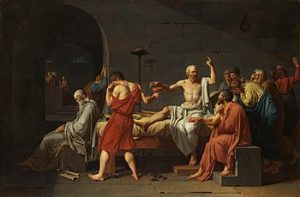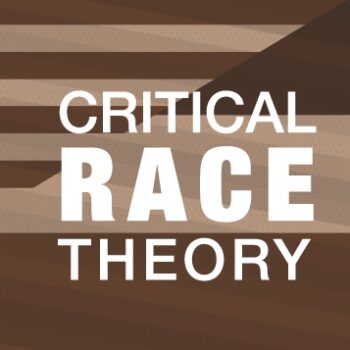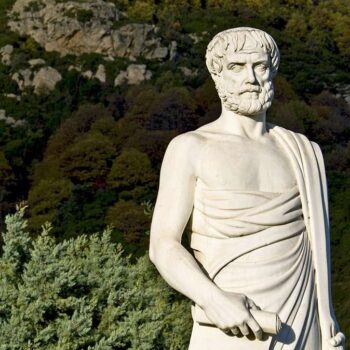
The Death of Socrates (Jacque-Louis David, 1787)
Socrates is philosophy’s most famous martyr. Yet he wasn’t the first tried in the courts of Athens. The Decree of Diopeithes allowed for the persecution of “those who fail to respect (nomizein) things divine or teach theories about the heavens” (OCD). It had been used against Anaxagoras, who challenged traditional views of gods and taught the heavens were merely burning stones. There is also evidence that Diogones of Apollonia was accused (Laks, 7). Numerous other thinkers and statesmen were also sentenced to death for various reasons around this time: Sophocles is only the most famous of others to be executed for impiety (Johnson, 152)
The rigid legal system was a sign of the crisis in religious and moral traditions at the time, and of the fear of those governing. The legitimation of morality in Athens, like the legitimacy of religion, was viewed as under threat. The Presocratics along with the Sophists — and some other thinkers — were seen as a threat to the civil order. Here religion was not a private affair. There was a civil obligation to participate in religious rites. It would have been widely accepted that the gods may punish the city for the impiety of its members. There would have been a strong desire among many to prevent the teaching of new ideas about the gods and to halt any questioning of traditional ethics. New teachers of all sorts were suspect.
Socrates and Xenophon both make strains to distinguish Socrates from the Sophists and the Presocratics, the philosophers of nature like Anaxagoras, who Pericles had invited to Athens. This is writ large in The Apology and Plato’s general narrative about Socrates. Aristophanes’ The Clouds, however, told a different story, one that would have been familiar to many at Socrates’ trial. Aristophanes’ work might be read as an early medial attack on a leading public figure. It set up Socrates, apparently very unjustly, for a fall. We can imagine that it also influenced Plato’s later developed view of the potentially negative role art could play in a polis.
The alleged impiety of non-traditional thinkers like Socrates was of grave concern to many in Athens. Add to this the fact that Socrates had attracted to him members of the Thirty Tyrants who were had early staged a bloody coup of the Athenian government and harbored some of the strongest critics of the Athenian Democracy. Critias, his former student and the cousin to Plato’s mother, had lead the group. Charmides, a close associate, was Plato’s uncle (Johnson 145ff.). Socrates had also, no doubt, regularly embarrassed many of the leading figures of the city and not unlikely some on his jury or well-connected to jury members. The Athenian democracy, too, was a purely majoritarian political order, entailing all of the possible threats of a mobocracy. Spurred on by the fate of Socrates, Plato will later offer one of the most influential attacks on democracy in history, precisely as facilitating mob rule and rule by the least fit.
The jury, according to The Apology, consisted of 500 citizens of Athens. In the trial itself Socrates displays his typical irony. Specifically of importance for the case of denying the existence of the gods, Socrates relates how his entire philosophical quest (which is resulting in his now being tried) began only after his friend Chaerephon had been told by the priestess of the Oracle at Delphi of the judgment of the Oracle that none was wiser than Socrates. The irony here of course is that the Oracle is deeply significant for the religious. Do the religious really want to condemn one who their own most famous oracle has said was unmatched in his wisdom?
There would of course have been various ways to understand the Oracle. One might have understood it to mean that no man is wise at all — along the lines of Heraclitus’ fragment that “a man is found foolish by a god…” (D 79). So Socrates’ wisdom like that of all other men would be negligible. Socrates however does interpret the Oracle rather more commonly as implying that he does possess a kind of wisdom. Interestingly, though, Socrates does not simply accept the statement of the Oracle on faith. He trusts his own reasoning, not the declaration of a religious authority. So he sets out apparently thinking it may be possible to show the Oracle wrong. Socrates surely has a different piety than most Athenians. His has underlined the importance of trusting his own reasoning, not that of authorities. Yet he does come to see the truth of the Oracle. As earlier discussed, he sees a form of wisdom in his understanding of the limits of his own knowledge.
The story of the Oracle of course provide Socrates with the possibility of describing how he came to be a public philosopher. Yet, since this is the major Oracle of religious importance, the story serves as a sort of witness of character — for those willing to believe, from the gods. Much of what Socrates offers in the court scene similarly witnesses to his character. He recounts his service in the Peloponnesian War. He distances himself from the natural philosophers who had otherwise been tried in Athens, noting that as a young man he had already turned his back on their speculations having found them bereft of evidence and also unimportant since the teaching would not improve the soul of man. Similarly, he distances himself from other new atheists, the sophists, who are known to teach for profit. The former group may teach heresy about the gods. The latter were in many cases more vehement about their atheism, not redefining the gods anew, and they were thought to corrupt the youth. Socrates shows he has a kind of piety. By contrast with the sophists — he maintains — he fundamentally cares about the soul. Further, he claims not really teach at all. He just spurs his interlocutors on to self-reflection in conversations. In his plea, Socrates reveals that he is not like Heraclitus, who condemned the religious rites as having a corrupting influence on those who practiced them. Socrates may have unorthodox views about the gods, but he still participates respectfully in the civic religious ceremonies. More still, Socrates, even is led in his decisions, always consulting with the voice of a daemon, which speaks to his conscience, not bidding him positive things to do but warning him when he should avoid some negative course of action. Though his defense does show that he is far from Orthodox, it also does show Socrates to be a deeply spiritual man.
Is he an atheist? It is clear that he does not believe in the gods of Hesiod. Does he corrupt the young? He does for those who think that teaching non-traditional ideas about the gods and about morality is corrupt. Socrates, however, makes his case denying atheism and maintaining that he did not take money for teaching like the sophists, who it is implied might really be considered to corrupt the young. And in any case he underlines he would only encourage the young to use their minds, to care for their souls, that which is best in them.
In the end the 500 votes were cast. It was a close decision, as Socrates was found guilty by fewer than 30 votes. But guilty he was found. It thus came to him to propose a penalty. Now, though, in a display of Socratic irony, even at this point Socrates refuses to placate his jurors. As a proposed punishment, rather than suggesting a reasonable fine or exile — something customary that may well have swayed enough jurors in his favor — as punishment, he suggests free meals at the Prytaneum for life, the reward for Olympian heroes. Would not Socrates deserve at least as much since he cared for what is most important in man — not the body but the soul? This was clearly in jest. But large numbers in the jury, we can well imagine, would have been less than amused. He then notes that he has but one mena, an amount that would buy a copy of Hesiod — so again, an insult. So he finally suggests that his friends wold come up with thirty menas (Johnson, 167), about 1/5 of his annual income. This was not insignificant but was still not a serious amount of money as an alternative to a death penalty. At the jury reconvening, in a larger number than the initial vote, they sentence Socrates — to death by the drinking of hemlock (Johnson 151ff.).
Socrates in prison
Ordinarily Socrates would have been executed the day after the trial. But because of a religious ceremony over three days, the execution had to be postponed. The prison reflections that occur (or that Plato places) in this period in Crito and Phaedo provide Socrates (or Plato) an opportunity to reflect on the trial, of his views of his obligations to the state and on his views of death. They show Socrates content with his decisions in the trial and willing to face death, even if it is unjust.
Crito, who the dialogue is named after, depicts conversations between Socrates and his friend in his final days. In the dialogue, Crito offers arguments critical of Socrates’ behavior in the trial and reasons for Socrates to allow his friends to pay a bribe so that Socrates can flee prison. Socrates in each case offers counter arguments that Crito appears to find convincing. A first argument concerns why Socrates was so disregarding of the mores during the trial. Surely, Socrates would have had a better chance with his case had he simply been respectful of those trying him. To this Socrates indicates that he does not believe that respect in such arguments is due to those in power, but to those who who have truth on their side. “One should greatly value some opinions,” Socrates notes, “and not others.” Besides he argues, “A good life is more important than a long life.” Socrates is unrepentant. Crito is an obedient interlocutor.
Seeing that Socrates is in such a difficult situation and that Crito and his other friends can help, Crito suggests though that Socrates allow them to pay a bribe for his escape. This would have occurred often enough in the situation. Crito drives home particularly that this would be justified since the sentence was wrong, and indeed Socrates death would bring about a further wrong of depriving his wife and their children of his care. Socrates rejects this utilitarian argument about the greater of evils. He adheres to a strict ethics of duty. Even though the sentence was wrong, paying a bribe is wrong as well; and two wrongs does not make a right.
A tacit contract — and a basis for civil disobedience
Finally, Socrates argues that besides the fact that bribery is wrong, he thinks that has a duty to the city-state of Athens to accept the punishment of its legal system, even if that penalty is unjust. Here Socrates puts forward an argument that will be important in the history of philosophy that individuals living in a polity form a tacit contract with the political body from which they benefit. In Socrates’ case, he has benefited from his education in Athens and from the security of the city-state. So while he has a fundamental obligation to follow his conscience on matters of individual action, he also has an obligation to accept the punishment for that if the city-state metes it out.
Socrates implied throughout the court case that he has an obligation to follow a higher law than that of the city. He must follow his conscience in matters of personal action. Here, however, he displays a paradox, like later proponents of civil disobedience. While maintaining the duty to breach a particular law (here to question traditional views even if it is not permitted), he still affirms a basic duty to the system of law. He must accept the punishment the city-state provides for breaching that particular law.
The entire point is not so clearly laid out as it is displayed. Though these fundamental principles of what will become civil disobedience are not all clearly synthesized in a treatise, the basis for the argument is clearly to be reconstructed from the text.
There are some further elements in a teaching of civil disobedience as later developed missing here. In John Rawls 20th century theoretical formulation of the ideas, it is important that the breaches of the law be done with the purpose of pointing out the failure in the legal system to those in power so that they reform it. In most cases, civil disobedience later occurs not with individual actors, who would likely be ineffectual, but as part of a social movement.
Nonetheless, whatever differences there are between civil disobedience as a developed teaching and Socrates’ depicted actions in the trial and death scenes, there are some remarkable similarities. In the ideas depicted in these final scenes of Socrates life, we thus see two vital ideas for the later history of thought: the idea that there is a tacit contract between an individual and her polity; and the kernel of the often related teaching on civil disobedience.
On death and the soul
Phaedo is thought to be an middle period work of Plato. In it, Plato develops ideas on the immortality of the soul that many scholars think differ from Socrates’ own views. In part, this is because they show a tension with other views that are expressed on the soul by Socrates in the Apology. In that dialogue, contemplating death Socrates assures his friends that there is no need to fear, for it is one of two things. Either it is a night of dreamless sleep, which should cause none to worry, or it is as the poets claim, which is a reason to be cheerful. Socrates expresses a hope that it is the latter, but without a worry if it is not.
In Phaedo more Platonic views of the soul are introduced. In that dialogue, Socrates wife, Xanthippe and his child were sitting with Socrates when his friends entered to speak to him. They are led away after the arrival of the friends. In the ensuing scenes the character Socrates is together with Crito, Cebes, Simmias, and Phaedo discussing many (of Plato’s) ideas about the soul.
One of the remarkable elements of Socrates’ death scenes is the great serenity with which he is shown to confront death. He is 70 at the time of his execution. He exudes a sense that he has lived a life of good conscience and he can die in peace. After a long discussion, Socrates finally summons the guard for the hemlock. He drinks it and settles down to die. Of those present, Socrates alone remains clam. He eventually lies down and covers himself. The parting words of the philosopher were a request to settle debts: “He was beginning to grow cold about the groin, when he uncovered his face, for he had covered himself up, and said—they were his last words—he said: Crito, I owe a cock to Asclepius; will you remember to pay the debt? The debt shall be paid, said Crito.”
Go to chapter 8, Plato.
Useful sources

